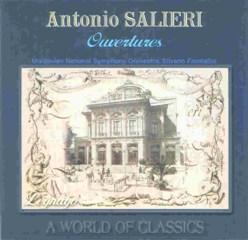Antonio Salieri – Ouvertures (2000)
Antonio Salieri – Ouvertures (2000)

01 - La secchia rapita 02 - Les Danaides 03 - Palmira Regina di Persia 04 - La fiera di Venezia 05 - Axur Re d'Ormus 06 - La Grotta di Trofonio 07 - Ouverture in Re maggiore 08 - Europa Riconosciuta 09 - Variazioni sulla Follia di Spagna Moldavian National Symphony Orchestra Silvano Frontalini – conductor
Antonio Salieri is still better known today for the renowned composers with whom he was associated than for his own many and varied compositions. While he cannot be ranked among the great masters himself, he has nevertheless come into view as an underrated and important composer deserving of closer attention. Salieri was the dominant figure in Parisian opera from the mid to late 1780s. Tarare (1787), generally considered his finest achievement in the genre, is a masterpiece. He also wrote significant instrumental, sacred, and vocal compositions, and shaped the Viennese musical world that would produce so many important composers for a century and a half. Salieri's illustrious students included Beethoven, Schubert, Liszt, Hummel, and Czerny. There is no evidence to support the durable legend that he poisoned Mozart and created intrigues against him. One of his students was Wolfgang A. Mozart, Jr., whom he would probably not have selected for instruction had he harbored such malice toward his father.
Salieri was born in Legnago, Italy, in 1750. At an early age, he took his first lessons, on both violin and harpsichord, from his older brother, Francesco. Later on he studied violin with local organist Giuseppe Simoni. At 15, Salieri lived for a brief period in Padua with another brother, a monk, after his parents' deaths. But his already formidable musical talents had drawn notice, and a family friend, Giovanni Mocenigo, arranged for his continued musical education in Venice. Salieri studied for a year there with Giovanni Pescetti and Ferdinando Pacini.
Impressed by his talents, visiting Vienna Court composer Florian Leopold Gassman took him back to the Austrian capital in 1766, where he taught him composition and introduced him to the court of Joseph II. By 1768, Salieri had composed his first opera, La vestale, probably not a success and now lost. His first surviving opera, Le donne letterate, was good enough to have impressed his new friend Gluck. Armida followed in 1771 and achieved wide success, assuring Salieri recognition in the highest Viennese musical circles.
Salieri was appointed court composer upon the death of Gassman in 1774. In addition, he became conductor of the city's Italian opera company. He was now one of the most influential figures in European music, holding a position of eminence that Mozart and other talented composers of the day would never attain. Salieri went on to score triumphs in Milan (L'Europa riconosciuta; 1778) and in Venice (La scuola de' gelosi; 1778), while he was on leave from the Vienna court for two years. He surpassed these successes with his next operas, given in Paris. With the help of Gluck, Les Danaïdes (1784) was performed to enthusiastic audiences there, but was far overshadowed by the sensation of Tarare (1787). Salieri would never have a finer moment.
In 1788, Salieri became court music director, and he retained the post following the death of Joseph II in 1790. Over the next decade-and-a-half, he did not explore new directions in his operatic style, thus falling out of fashion even before the turn of the nineteenth century. Aware of his own conservatism, he wrote no operas after 1804. He served as court music director until March 1824, remaining active in the musical life of Vienna and teaching many students. He also continued writing sacred and instrumental music.
Salieri fathered eight children and by all accounts was a decent man. Near the end of his life, he was placed in an asylum owing to his deteriorating mental and physical states. He died in Vienna on May 7, 1825. --- Robert Cummings, Rovi
download: uploaded yandex 4shared mediafire solidfiles mega zalivalka filecloudio anonfiles oboom ziddu
Last Updated (Tuesday, 22 April 2014 14:22)








